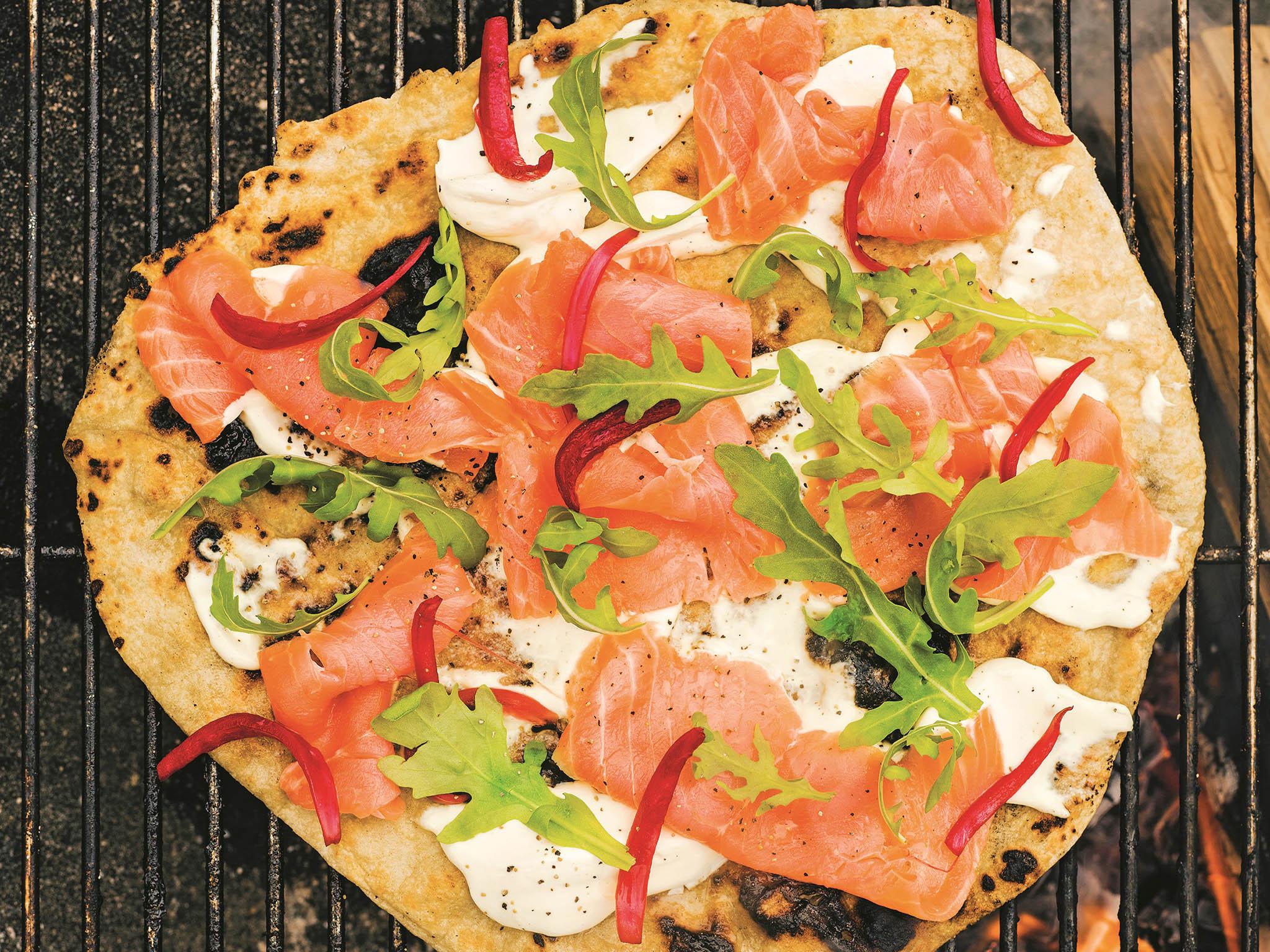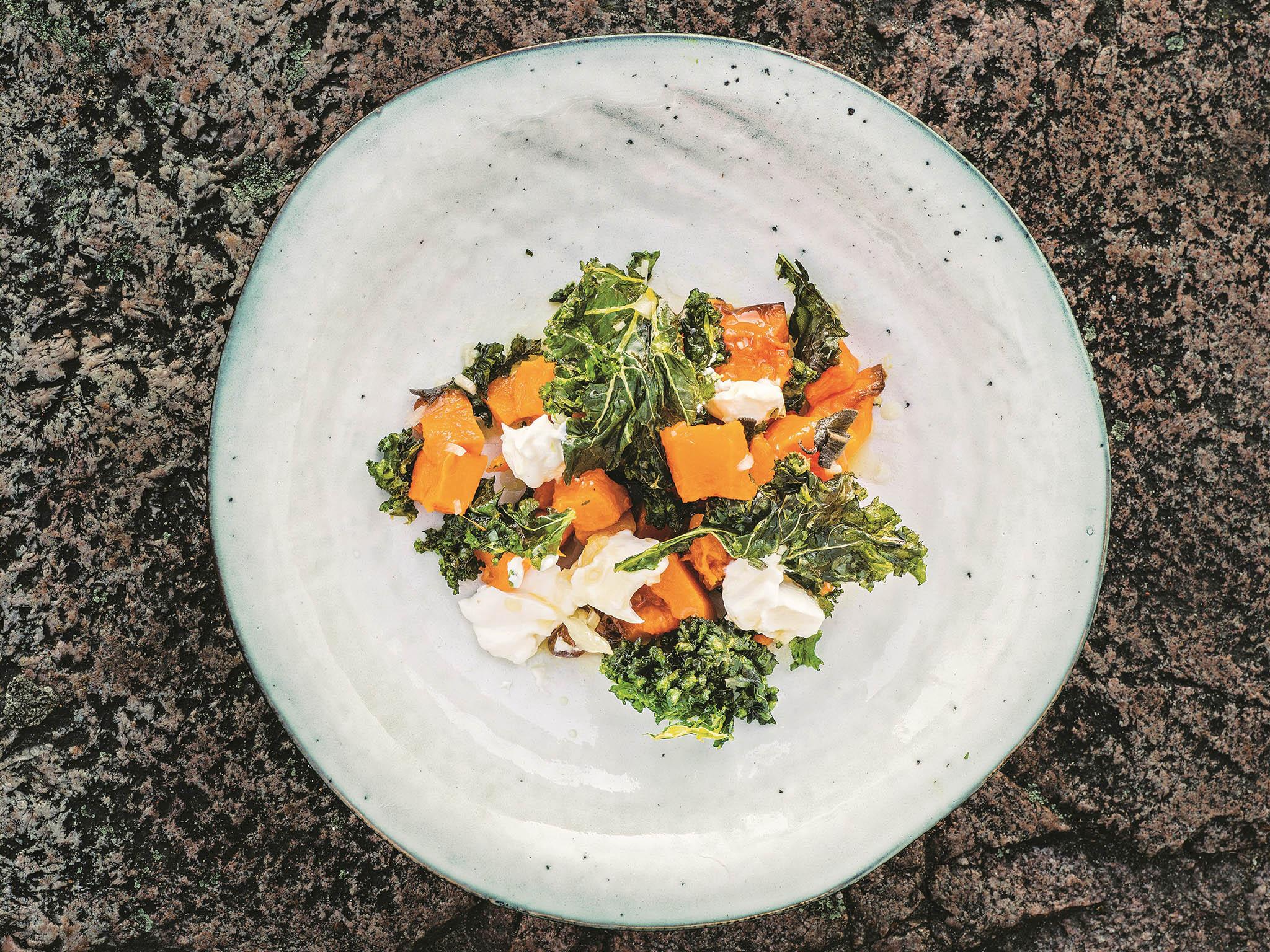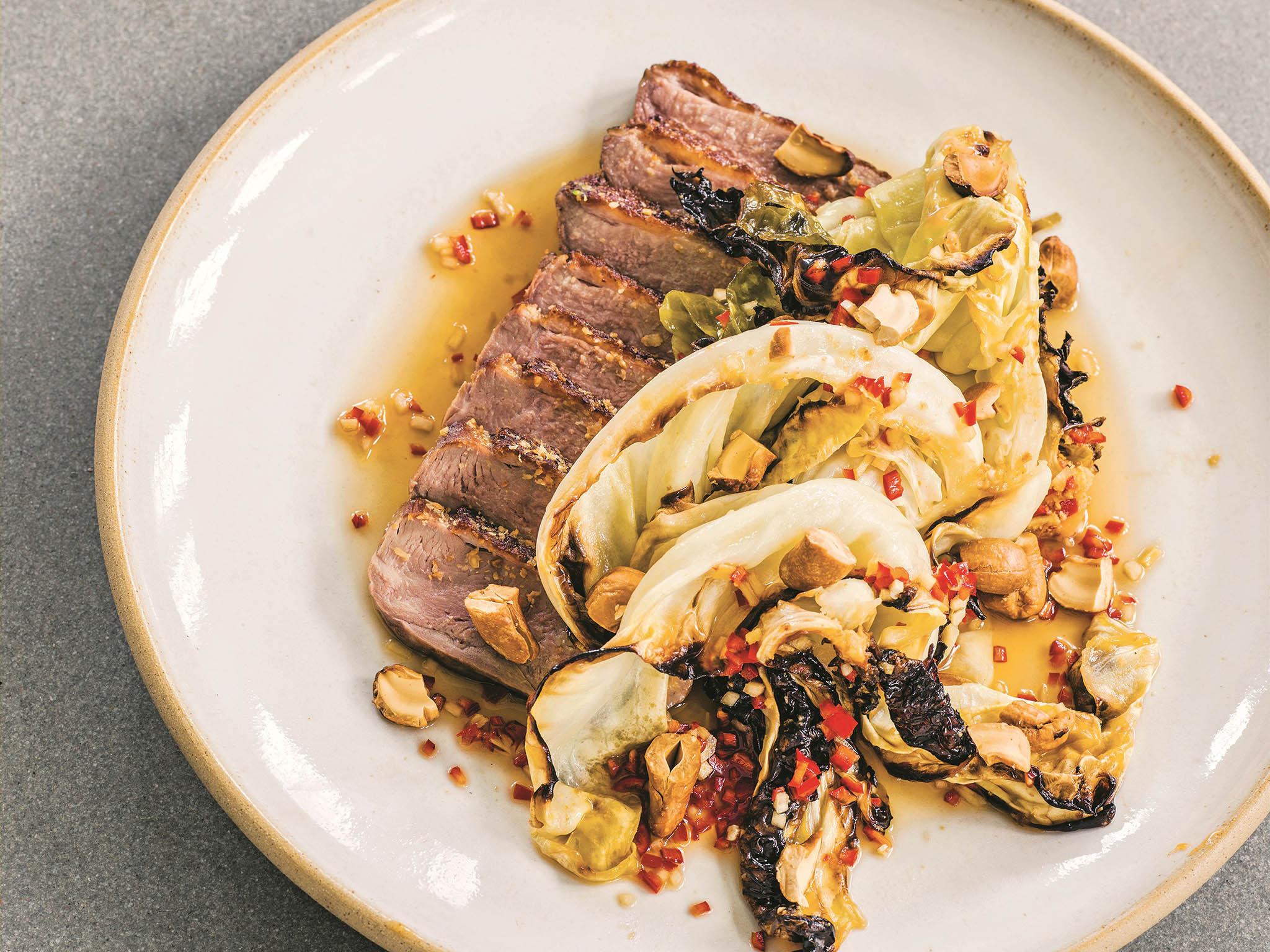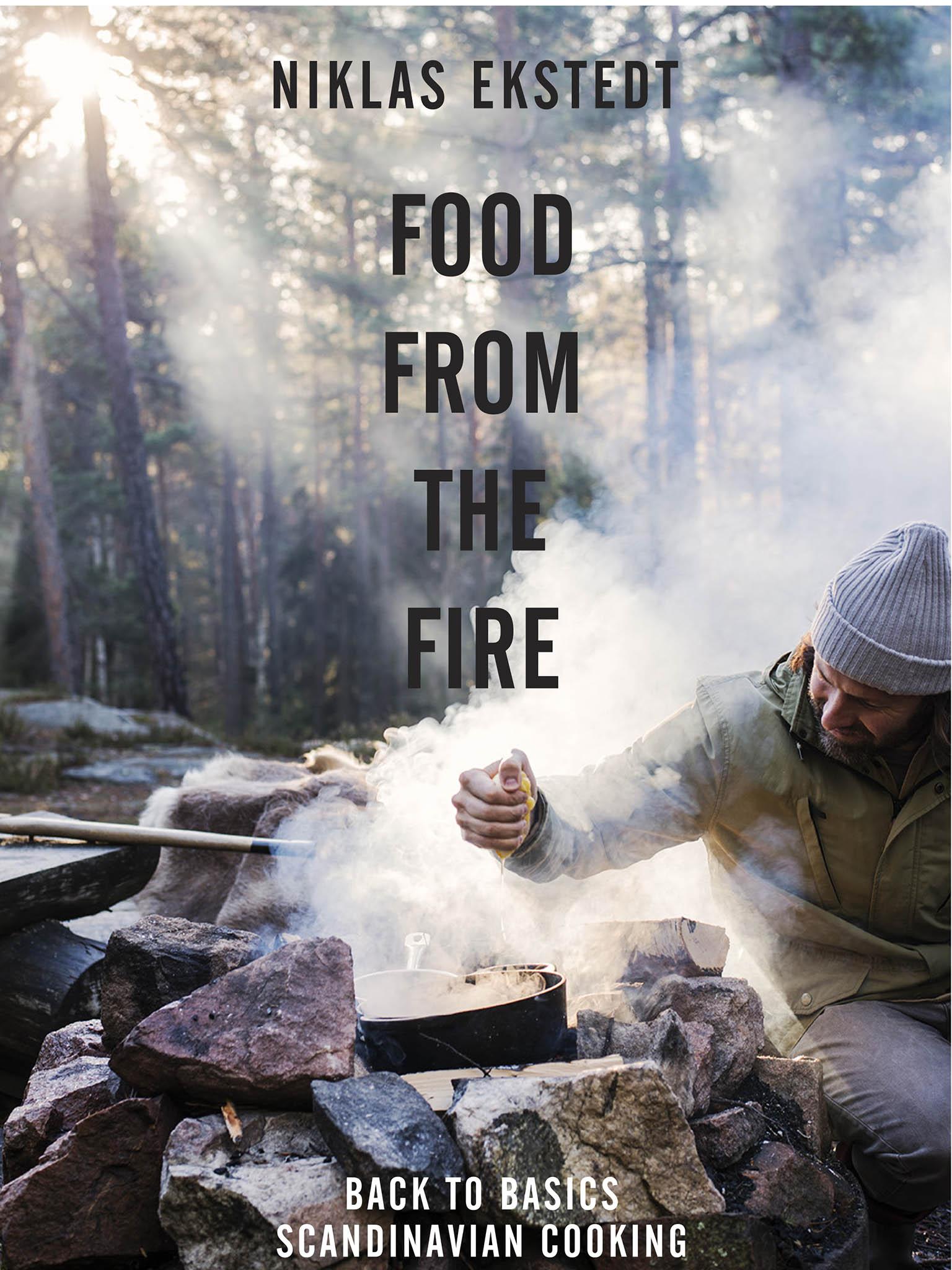Food From The Fire cookbook: From smoked duck to salmon flatbreads
Using Scandinavian flavours and open fire cooking Niklas Ekstedt has returned to his roots and celebrates the rustic slow cooking of his country

Adding his own touch to the Nordic food scene, Niklas Ekstedt took inspiration from the island of Ingaro in the Stockholm archipelago, after spending the summer of 2011 there with his young family. Hours of staring at the forest turned into a realisation that it was right in front of him – outdoor cooking, which was once the core of Swedish cuisine.
Published earlier this month, the book gives a step by step guide to building an open fire pit, and the essential elements of the analogue kitchen, as he calls it; including wood, fire, smoke, cast iron and fat. Here’s a selection of recipes from the book to try yourself.

Butternut squash, fresh cheese, kale crisps and rowan capers
If you pick rowanberries in the autumn, you can preserve them with vinegar and sugar as rowan capers. But if you’ve missed the rowanberry season, regular capers work well, too. Make them at least a week before you embark on this salad. Pumpkin or sweet potato works equally well, in place of the squash.
Serves 4
8 large kale leaves
4 tbsp extra virgin olive oil
1½ tsp salt
1 butternut squash, peeled and deseeded
200g spicy fresh cheese (see below), or ricotta
4 tsp rowan capers – alternatively use elderberry capers or regular capers
450g freshly picked red rowanberries
450g salt
450ml attika (Swedish white vinegar), or 900ml white wine vinegar
900g sugar
900ml cups water
To make the rowan capers: remove all the stalks and rinse the berries in cold water. Put the berries in a large pan and add the salt and water to cover. Bring to the boil and simmer for 5 minutes. Drain the berries and rinse in cold water. Combine the vinegar, sugar and water in a large pan and heat until the sugar has dissolved. Add the berries and bring slowly to the boil over medium heat. Pour into a sterilised jar, cover with a lid and leave to cool.
Store in the refrigerator for a week before serving. They will keep for up to one year. Preheat the oven to 200°C. Clean the kale in cold water and dry with paper towels. Cut the kale into pieces about 5cm square, place on a baking sheet and toss with 1 tablespoon of the olive oil and ½ teaspoon salt. Bake for 10–12 minutes until crisp.
Turn the oven down to 180°C. Cut the butternut squash into roughly 2cm cubes and place on a baking sheet. Sprinkle with 2 tablespoons of olive oil and 1 teaspoon of salt. Bake for about 25 minutes; use a knife to check that the squash is soft in the centre. Serve the baked squash, kale crisps, fresh cheese and capers in a bowl. Sprinkle with 4 teaspoons of extra virgin olive oil and 4 teaspoons of pickling liquid from the rowan capers.
Spicy fresh cheese
Makes approximately 450g
1 tsp caraway seeds
1 tsp fennel seeds
½ tsp paprika
½ tsp dried dill
450g fresh sour cream cheese
Grind all the spices together in a mortar. Mix with the cheese and season with salt to taste. Store in the refrigerator.
Flatbread with smoked salmon, onions, homemade sour cream and rocket
My interpretation of a Swedish pizza. Try this with other toppings, such as cured venison, mayonnaise and freshly grated horseradish.
Makes 8 pizzas
Toppings
700g cold-smoked salmon, thinly sliced
120ml homemade sour cream (see below)
55g pink pickled onions (see below)
1 bunch of rocket
Freshly ground black pepper
Pizza dough
40g fresh yeast
300ml lukewarm water
350g strong white bread flour, plus extra for dusting
1 tsp salt
3 tbsp olive oil
2 tsp sugar
To make the pizza dough: mix the yeast with the water until dissolved, and set aside for 5–10 minutes. Sift the flour and salt into a food processor or a large bowl. Add the yeast liquid, olive oil, and sugar. Mix to form a dough and knead – in the processor or by hand – until the dough is smooth and springy. Place the ball of dough in a large, flour-dusted bowl and flour the top of it. Cover the bowl with a damp tea towel and leave in a warm place for about 1 hour until the dough has doubled in size.
Preheat the oven to 200°C. Lightly flour a large baking sheet. Turn out the dough onto a floured work surface, then divide it into eight equal pieces. Roll out each piece with a rolling pin, or stretch by hand, to about 5mm thick and place on the floured baking sheet. Working in batches (depending on the size of your baking sheet), cook each pizza for about 3 minutes. It should be baked all the way through, but not coloured. Remove from the oven and leave to cool on a wire rack, covering the pizza with a tea towel.
To serve: grill the pizzas on a grill grate over an open fire, or cook them in a large, hot, cast-iron pan for about 3 minutes on each side until lightly browned. Top with smoked salmon, sour cream, pickled onion, rocket and black pepper, and serve at once.
Homemade sour cream
225ml double cream
1 tbsp buttermilk
Combine the cream and buttermilk in a bowl. Cover and leave to stand at room temperature for 2 days. Store the homemade sour cream in the refrigerator for up to 5 days.
Pink pickled onions
1 red onion, sliced
90ml pickling liquid 1-2-3 (see below), cooled
Combine the red onion and pickling liquid. Cover and store in a cold place for 4 hours.
Pickling liquid 1-2-3
A Swedish feast cannot be without pickles. Pickling was historically an important way to preserve the harvest before the winter in Sweden. Attika is a strong Swedish white vinegar that is traditionally used for preserving. 1-2-3 refers to the proportions of vinegar, sugar and water, and this recipe is the basis for many pickled vegetables and fish.
In many countries the white distilled vinegar used for pickling is less concentrated (5–8 per cent); if using this type of vinegar, the proportions of the recipe change to 2-2-2 – in other words, use more vinegar and less water.
Makes approximately 2.5 litres
450ml attika
900g sugar
1.4l water
1 tsp black peppercorns
3 bay leaves
Combine all the ingredients in a large pan and bring to the boil. Stir until the sugar has dissolved.

Smoked duck breast with spicy cured cabbage
For this dish, the cured cabbage needs to be started two days in advance.
Serves 4
2 duck breasts, each weighing about 450g
85g (superfine) sugar
55g salt
300ml water
12 allspice berries
2 cinnamon sticks
10 cloves
3cm piece of fresh ginger, peeled and chopped
55g cashew nuts, roasted
12 pieces of cured cabbage
120ml dipping sauce
1 bunch of coriander, leaves only
Cured cabbage
1–2 large pointed cabbages
30g salt
2 red chillies, deseeded
4 garlic cloves, peeled
½ onion, roughly chopped
2 tsp grated fresh ginger
1 tbsp caster (superfine) sugar
2 tbsp fish sauce
Dipping sauce
40g palm sugar
150ml water
150ml fish sauce
1 tsp freshly squeezed lime juice
1 tbsp rice wine vinegar
4 tbsp Japanese soy sauce
1 tbsp finely chopped deseeded red chilli
Begin by preparing the cured cabbage. Set up a fire pit with a grill grate, using firewood. Cut the cabbage into large wedges – three pieces per person. Place on the grill grate, sliced surface down, and sear over medium heat. Alternatively, sear in a hot pan. Remove from the grill, rub salt into the cabbage and store in the refrigerator for 24 hours.
The next day, combine the chillies, garlic, onion, ginger, sugar and fish sauce in a blender and blend to a smooth paste. Rinse the cabbage in cold water, and dry with paper towels. Pour over the spicy paste and store in the refrigerator for 12–24 hours. For the duck, put the sugar, salt, water, allspice, cinnamon, cloves and ginger in a saucepan. Bring to the boil over medium heat and simmer for 5 minutes. Remove from the heat and leave for 30 minutes. Strain and leave until completely cool.
Put the duck breasts in a bowl, cover with the marinade and store in the refrigerator for 4 hours. To make the dipping sauce, put the palm sugar and water in a saucepan over medium–high heat and bring to the boil until the sugar has dissolved. Leave to cool. Add the remaining ingredients and store in a jar in a cool, dark place.

Preheat the smoker to 100°C. Pour off the marinade and dry the duck with paper towels. Score the duck skin with a sharp knife. Smoke for about 30 minutes until the internal temperature reaches 58°C. If you don’t have a cooking thermometer, test by pressing the duck breast firmly with your finger: the meat should feel quite soft but should spring back slightly to the touch. Rest for 5–10 minutes.
Heat the cabbage in the smoker for 10 minutes. Slice the duck breast and serve with wedges of cabbage, the dipping sauce, roasted cashew nuts, and coriander leaves. You could also serve basmati rice as an accompaniment.
‘Food from the Fire’ by Niklas Ekstedt, published by Pavilion Books. Photography by Haarala Hamilton
Join our commenting forum
Join thought-provoking conversations, follow other Independent readers and see their replies
Comments
Bookmark popover
Removed from bookmarks